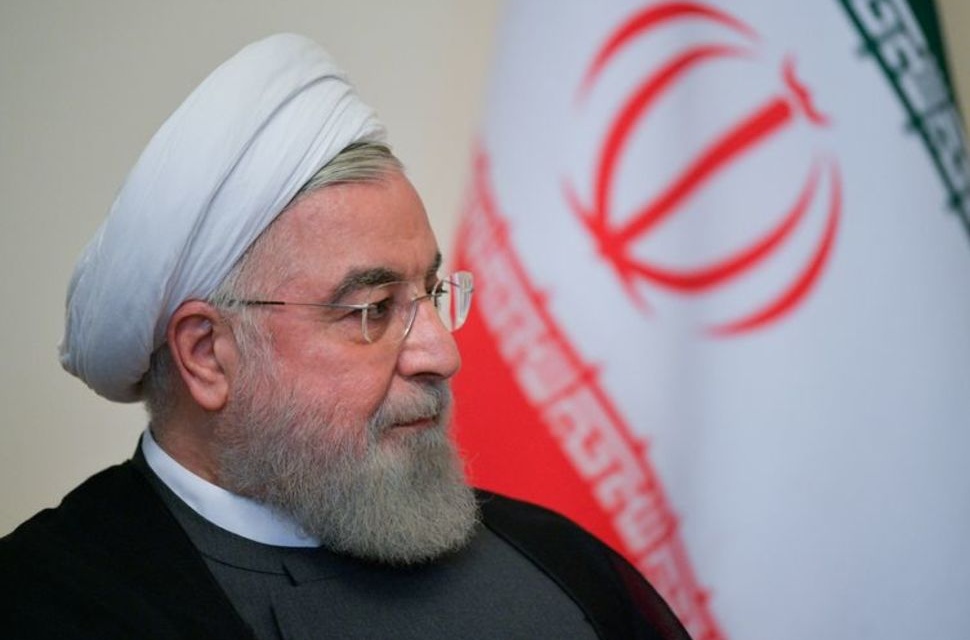Iran’s President Hassan Rouhani has warned hardliners not to block the possibility of the US lifting sanctions, in a resolution of the 2015 nuclear deal between Tehran and the 5+1 Powers.
Publicly the maneuvers between the Rouhani Government and Biden Administration are stalemated. Iran is insisting on sanctions removals before any discussions and a US re-entry to the deal, from which Donald Trump withdrew in May 2018. Washington is calling for an Iranian return to compliance with the agreement’s provision, suspending enrichment of 20% uranium and the operation of advanced centrifuges.
But US National Security Advisor Jake Sullivan has said that there is indirect contact with the Iranians through European and other channels, raising a “sequenced” approach linking sanctions removal and Tehran’s compliance. Iranian officials have publicly denied that the indirect discussions are underway.
See also Iran Publicly Slams Door on “Sequenced” Nuclear Talks
Rouhani has said that the US can return “within an hour” to the Joint Comprehensive Plan of Action if sanctions are lifted. He asserted in televised remarks on Wednesday:
It is a great betrayal of the Iranian nation if any faction or person delays the end of the sanctions even for one hour.
The small minority that is obstructing this path needs to stop its destructive act. If it stops…the government can break the sanctions,.
Rouhani said “conditions are better than ever for the lifting of the sanctions”, with the US willing to return to the deal. He maintained, “Words are not enough. We are waiting for action.”
However, the Iranian Government has yet to produce the “constructive, concrete plan of action” promised by Foreign Minister Mohammad Javad Zarif on March 5.
Iran holds Presidential elections in June. Rouhani cannot stand for a third term, and hardliners are favored to regain the Presidency, with judiciary head Ebrahim Raisi — who lost to Rouhani in 2017 — Parliament Speaker Mohammad Baqer Qalibaf, and former Defense Minister Hossein Dehghan among possible candidates.
A Biden Administration consultant told journalist Laura Rozen: I think increasingly people in the Biden team are coming to the conclusion that Iran’s domestic politics are proving to be an insurmountable obstacle to any diplomatic progress right now….
The reality is that the lack of movement is probably indicative of the fact that internally it has proven impossible to build a consensus on what an acceptable gesture for gesture would look like.
It should not be too difficult for the Iranians to put ideas on the table. But domestic politics just doesn’t allow it.
French Foreign Minister Jean-Yves Le Drian also spoke of the indirect contacts between the US and Iran, with Europeans as the channel: “We are sending signals to the Iranians so that we can have this return [to the nuclear deal], which would be the prelude to a wider discussion.”
But he cited the “tactical problem” and the “particular situation because we are quite close to the [Iranian] Presidential election in June”.
Macron: “Iran Must Behave In A Responsible Way”
French President Emmanuel Macron chided Tehran over its “violations” of provisions:
Iran must stop aggravating a serious nuclear situation with an accumulation of violations of the Vienna accord.
Iran must make the expected gestures and behave in a responsible way.
Macron reiterated that, beyond US re-entry to the JCPOA, the agreement must be revised and expanded: “That means a return to control and supervision of the nuclear programme, but also to integrating — as we have called for since 2017 – the control of Iran’s ballistic missile activity.”
The Supreme Leader and Rouhani have ruled out any renegotiation of provisions, and have said that ballistic missile development is not up for consideration.

